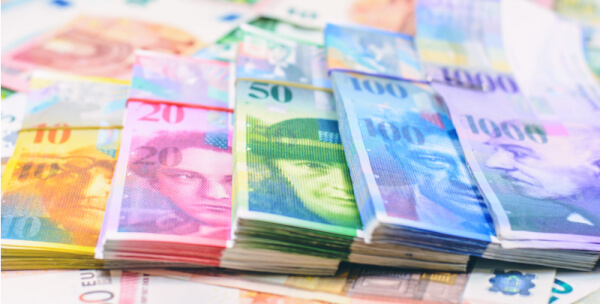Is it better to use cash or card in Switzerland?
What's the best way to pay in Switzerland - cash or card? Read our handy guide on Swiss francs, cash etiquette, Swiss ATMs and using your UK card.

Planning a trip to Switzerland from the UK? Whether it’s a skiing holiday in Zermatt, city break in beautiful Bern or even a business trip to Zurich, you’re going to need to plan your spending money.
If you prefer to spend in cash while abroad, we’re here to help - with a handy guide to ATMs in Switzerland. So read on for info on where to find ATMs, what fees they charge and whether UK cards work in all Swiss cash machines.
We’ll even show you a super convenient way to spend abroad using the Wise card, which works in 150+ countries.
But for now, let’s focus on where to withdraw Swiss francs during your trip.
Switzerland is a global financial capital, so you shouldn’t have any trouble finding an ATM.
You’ll find a bank on more or less every corner in the bigger cities - with an ATM, of course. In more rural areas, there will be fewer ATMs to choose from, but as the country aims to be tourist-friendly, you’ll find even smaller towns are fairly well served by banks and ATMs.
To find a convenient ATM, use these ATM locator tools from major Swiss banks:
ATMs in Switzerland are generally called Bancomats, although you might also see them called Bankautomat or Postomat.
ATMs in Switzerland generally accept Visa and Mastercard debit and credit cards. This is good news for UK travellers, as these are the most commonly issued types of cards in the UK. Both local and foreign-issued cards should be accepted in most cases.
You can search for your nearest cash machine in Switzerland with these global ATM locators:
In Switzerland, it’s possible for debit and credit cards to have a 4, 5 or 6 digit PIN code.¹
Most ATMs - and certainly any newer ones - will accept a PIN of 4, 5 or 6 digits. That means that if you have a chip and PIN card with a 4 digit PIN - like those issued in the UK, for example - you should have no problem.
Chip and PIN technology is widely used in Switzerland, along with contactless payments. So if you have a card with just a magnetic stripe and no chip, you may not be able to use it at ATMs and in shops.
The maximum amount you can withdraw from an overseas ATM will largely depend on your bank back in the UK. Each bank usually has its own daily, weekly and/or monthly withdrawal limits.
But there are also the limits imposed by the ATM you’re using. In Switzerland, you may encounter maximum withdrawal limits of around 5,000 CHF (approx. £4,490 GBP).²
These days, it isn’t usually essential to tell your bank you’ll be using your debit card abroad. But it could be an idea to do it anyway, to prevent any disruptions to your travel spending.
In rare cases, your overseas transactions could be flagged up as fraud or your card blocked. This is obviously the last thing you want to happen during your Swiss holiday.
To avoid any of this hassle, it could even be worth getting an alternative spending card - one that is specially designed for international travel.
A great option is the Wise card, as it works in 150+ countries and lets you withdraw up to £200 a month (max. 2 withdrawals) from overseas ATMs without any fees. Wise doesn’t charge for these withdrawals but you’ll need to check that the ATM operator doesn’t charge its own fees.
Choose to withdraw in the local currency and your Wise card will do the currency conversion at the mid-market exchange rate with only a small conversion fee*.
This means no expensive mark-ups eating into your spending money.
In the UK, it’s usually free to use ATMs - although some privately operated cash machines have a fee. But how does it work in Switzerland?
Read on for an idea of ATM fees in the country.
The first thing to get to grips with when using an overseas ATM is currency conversion.
If you’ve ever used an ATM in another country, you’ll have encountered a screen asking if you want the transaction to be carried out in your home currency (British pounds) or the local currency (in this case, Swiss Francs).
When asked, always choose to withdraw or spend in the local currency. This means that the ATM doesn’t convert the currency and give you its own (usually bad) exchange rate. This is calculated using something called Dynamic Currency Conversion (DCC), and it’s usually unfavourable - making the withdrawal more expensive for you.
Opt to withdraw in CHF rather than GBP and the conversion will be done by your bank or card provider instead - where the rate will be better.
So the bottom line is - it’s always best to press ‘no’ when asked about currency conversion.
Before you fly to Switzerland, it’s worth checking whether your UK bank charges foreign transaction fees. These are often called ‘non-Sterling transaction fees’ and apply to overseas spending, cash withdrawals or both.
Take a look at the terms and conditions (and fee information document) for your account, or contact your bank to find out more.
Some Swiss banks may charge ATM fees, and you can expect to pay between 5 to 10 CHF for withdrawals using a foreign-issued card.³
If you have a card linked to a Swiss bank account, you should be able to use in-network ATMs for free.
It may be possible to get free cash withdrawals in Switzerland. You can try a few bank’s ATMs - if there’s a fee, it’ll be displayed on the screen before you confirm the transaction.
Alternatively, you can check if your UK bank has a partnership with any banks in Switzerland. If so, you may be able to withdraw cash for free (or for lower fees) at these ATMs.
Some overseas ATMs may offer you a ‘service’ of being charged in your local currency (i.e. GBP). This may seem convenient, but it could actually be the most expensive option.
Being charged in the local currency helps you avoid hidden ATM rip-offs by giving you the best possible exchange rate.
Choosing to see the transaction shown in British pounds gives the ATM permission to give you an arbitrary (generally much more unfavourable) exchange rate for your withdrawal. So, it’s best avoided.
Check out the latest GBP to CHF conversion rates below:
ATMs at airports tend to be very expensive, charging high fees for withdrawing money or converting currency. So even though they may be convenient, they’re best avoided unless you have no other option.
If your UK bank has an overseas ATM network or partners with banks in Switzerland, you may be able to benefit from low or no fees on ATM withdrawals. It’s always worth finding out before you travel.
Some UK banks charge foreign transaction fees for spending and cash withdrawals. If yours does this, it might be time to switch.
Another crucial thing to remember is that you should avoid making ATM withdrawals with a credit card.
It’s usually a lot more expensive than using a debit card, as fees are charged for cash-based transactions. Plus, interest will likely start accruing right away, so you won’t benefit from your usual interest-free period.
Travel a lot? If you’re something of a jetsetter, the Wise card is the perfect way to spend and withdraw cash internationally.
It’s a dedicated travel card, letting you spend like a local in 150+ countries worldwide. It automatically converts your pounds to the local currency at the mid-market exchange rate whenever you spend.
And when you need cash, you can use it to withdraw up to £200 a month (max. 2 withdrawals) fee-free. You’ll just need to check whether the ATM operator charges its own fees.
Wise only ever charges small, transparent fees* for currency conversion, and it’s fee-free if you already have the currency in your Wise account.
Sign up for a Wise account online and you can get your own Wise card for a one-time fee of just £7.
Yes, you should be fine to use your UK-issued debit card in Switzerland - as both Visa and Mastercard are widely accepted.
Although cards (and mobile wallets) are widely used and accepted there, it might still be a good idea to take a mix of cash and card to Switzerland for your trip.
You might find that having a few Swiss francs in cash is handy for things like tipping, taxis and purchases from street vendors.
Despite the country’s reputation as a global banking leader, the Swiss people are still quite attached to cash. Around 90% of businesses accept cash for face-to-face transactions, but the country is gradually moving towards becoming a cashless society - although perhaps more slowly than some other European countries.⁴
Yes, tipping is common in Switzerland, as a sign of appreciation for good service. However, service charges are automatically included in most restaurants, cafes and bars.⁵
While it depends where you plan to visit and what you plan to do, it’s recommended to take around £700 (approx. 779 CHF) per person for a week in Switzerland.⁶
Sources used:
Sources last checked on date: 25-Nov-2024
*Please see terms of use and product availability for your region or visit Wise fees and pricing for the most up to date pricing and fee information.
This publication is provided for general information purposes and does not constitute legal, tax or other professional advice from Wise Payments Limited or its subsidiaries and its affiliates, and it is not intended as a substitute for obtaining advice from a financial advisor or any other professional.
We make no representations, warranties or guarantees, whether expressed or implied, that the content in the publication is accurate, complete or up to date.

What's the best way to pay in Switzerland - cash or card? Read our handy guide on Swiss francs, cash etiquette, Swiss ATMs and using your UK card.

Planning a trip to Switzerland from the UK? Get advice on visas, safety, managing your money, and what to expect with this comprehensive travel guide.

Switzerland is just a flight away. Learn how to shop tax-free and obtain a VAT refund in Swiss cities like Geneva and Zurich as a tourist.

Check out our in-depth guide on everything you need to know about buying a prepaid Switzerland SIM card, including different providers, pricing, and features.

What’s the best way to buy train tickets in Switzerland? A handy guide including step-by-step instructions and FAQs.

Travelling to Switzerland? Find out everything you need to know about how to spend, and exchange money to Swiss francs. And, if you can use euros.